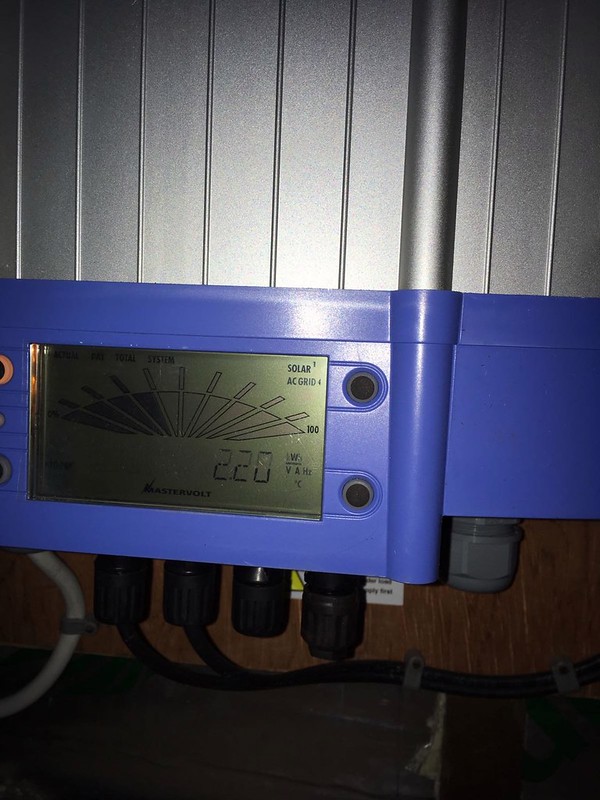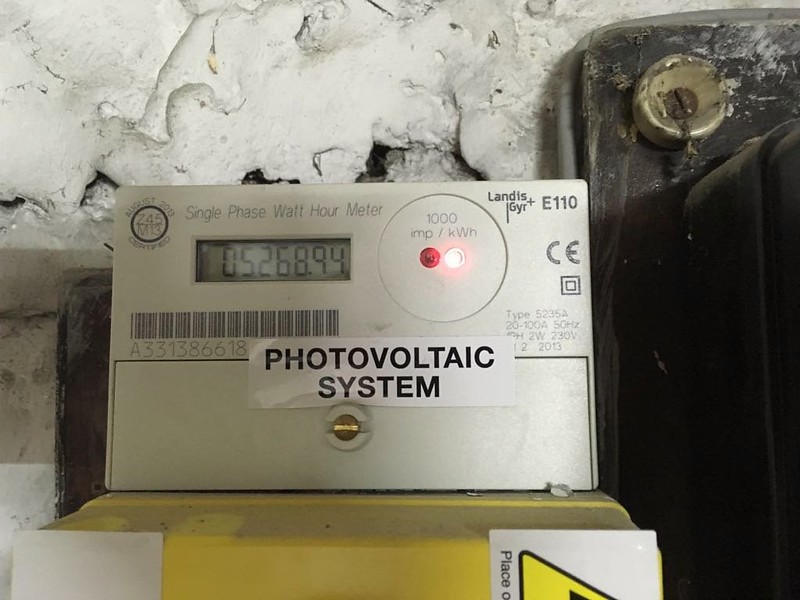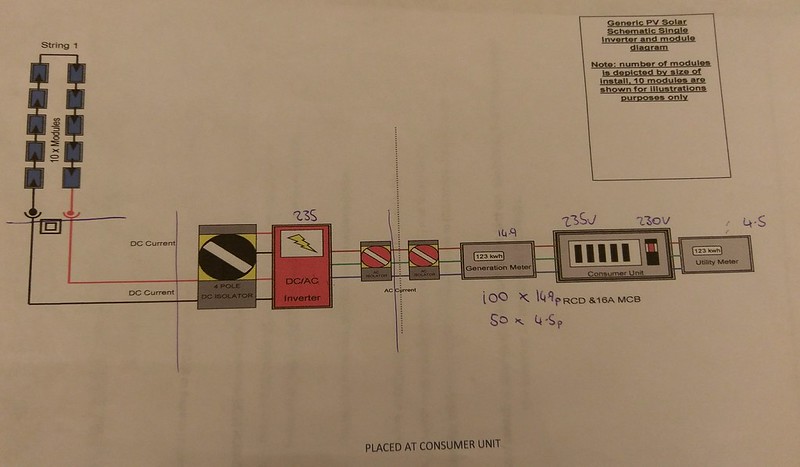- This topic has 9 replies, 7 voices, and was last updated 6 years ago by I_did_dab.
-
Help us understand our solar panel system
-
ahsatFull MemberPosted 6 years ago
So the house we bought came with 8 solar panels installed. 10 months later I have finally found the time to sit down and look at the paperwork to try and work out how it works.
My prime question is…is it better to put the dishwasher on in the day time (i.e. does this use solar power) or at night (and all the PV energy gets fed into the grid and we get it all back as feed in)? 😆
We have 8 Solarworld Sunmodule Plus on a west facing roof (yes not ideal!). This was installed by the previous owner and looking at the paperwork he was totally miss-sold! I know that the company he purchase then from went into liquidation due to miss-selling, so not a surprise….
Anyway…in the roof this is the inverter panel
[url=https://flic.kr/p/YqkyZm]2017-10-16_08-53-50[/url] by Tasha, on Flickr
This is what we believe is the generation panel (it doesn’t look like we have an export panel). For info, we believe this is the total generated in 4 years (pretty much to the month).
[url=https://flic.kr/p/Yqkz2f]2017-10-16_08-55-16[/url] by Tasha, on Flickr
And this is a diagram which seems to explain the installation
[url=https://flic.kr/p/ZqHVUC]2017-10-16_08-52-35[/url] by Tasha, on Flickr
We have a feed-in-tariff (14.9 p generation tariff unit; 4.94 p export tariff unit). This is currently with N-Power at the moment, but we are having a nightmare with the admin with this. What we want to understand is whether anyone can work out for us whether the system is using the generated PV before using that imported from the grid (i.e. putting the dishwasher on in the day time is better) or whether all that generated is being exported (i.e. just put the dishwater on at night!)?
At the moment it looks like we are using ~200 kWh of electricity per month (gas central heating, 2-person house) imported from the grid (supplier BG).
Any thoughts welcome! Know we aren’t going to make a fortune on this, but makes sense to try and make the most efficient use of it, as we have it!
BigJohnFull MemberPosted 6 years agoYou’ve asked the right people. I had a query on these things a while ago and lots of forumites are expert. I’ll try and find the link.
infidelFree MemberPosted 6 years agoLooks like you have a 2kw system. You’ll only have a generation meter at that size and not an export. FIT is guesstimated for domestic sized installations. You’ll get a generation tariff which is 100% of your quarters generation multiplied by the tariff the previous owners signed up to and an export tariff of 50% of the generation times the export rate. Because your a small installation and your export is assumed and not measured, it’s therefore best for you to try to use it rather than feed it in.
We use a Solar iBoost which basically measures the house use vs generation at any given time and when generation > use it uses the spare generated power to heat water in the hot water tank and will only allow feed in to the grid when the boiler is hot. It works well (lesss so fir us as we have solar thermal too which is heating water at the same time!)
So us dishwasher in the day!
thisisnotaspoonFree MemberPosted 6 years agoWhat they said, during the day the generation meter will be counting and you get paid 50% whether you export it or not. But if you use it you won’t be importing (and paying).
This assumes your main meter doesn’t spin backward when exporting (plenty do!).
I_did_dabFree MemberPosted 6 years agoin a nutshell: you get paid one rate for what you generate (whether you use it or not), you also get paid a lower rate for the unused amount you generate and export to the grid. This amount will be lower than your tariff for importing from the grid. So, use your electricity while you are generating – dishwasher, washing machine, charging batteries etc to save money overall.
It is also more CO2 efficient to use gas to heat water, rather than your solar electric. It may not save money, but will save the planet. So export your unused so that someone else can use it, to reduce demand for fossil fueled electricity.
infidelFree MemberPosted 6 years agoAs I said the exported electricity in a small domestic install is not actually measured, it us assumed to be 50% of that generated.
Re: CO2 efficiency – that does assume if course that the OP has gas to heat their water. Many rural homes (like mine) don’t so use oil/tank propane/biomass etc.ahsatFull MemberPosted 6 years agoThanks all. That all makes a lot more sense, along with my further reading last night. Think we will get about £230/year in FIT payments and looking at our bills, we are only paying about £16/month in electricity so clearly we are using the generated PV energy first. The dishwasher will carry on going on during the day!
We are on a gas combi for heating so don’t think we can do anything with that. Don’t think it’s one of the most efficient so will look to switch to a cheaper gas rate soon, and in the long run put a more efficient unit in.
The guy who put the solar panels in got totally shafted. I worked it would have cost him about 30 years to repay back the cost in savings!!
Cool. Thanks all. And with cutting our car usage down by about 70% due to our relocation too, things aren’t looking too bad.
natrixFree MemberPosted 6 years agoIt is also more CO2 efficient to use gas to heat water, rather than your solar electric
Really?!! How does heating water with solar electric create loads of CO2??
FlaperonFull MemberPosted 6 years agoIt is also more CO2 efficient to use gas to heat water, rather than your solar electric. It may not save money, but will save the planet
I_did_dabFree MemberPosted 6 years agoOK more explanation needed (sorry no citations).
Using your gas boiler to heat water directly at home is more efficient than using gas (to heat water to create steam to turn a turbine) to generate electricity. So its better for CO2 emissions to export your excess solar electricity (to be used elsewhere and reducing the amount of other generation), and burn gas for hot water, than use it directly to heat your water.
It won’t save money though.
Happy?
The topic ‘Help us understand our solar panel system’ is closed to new replies.




